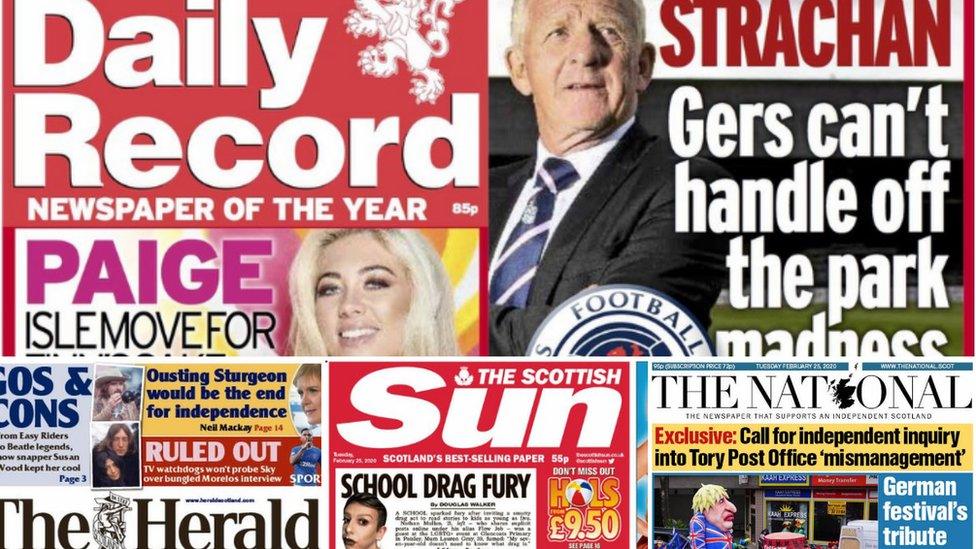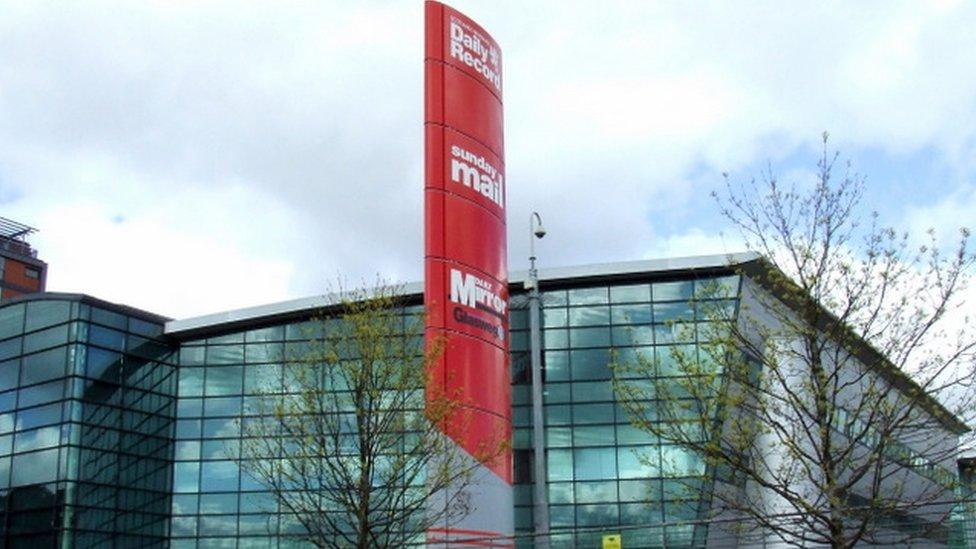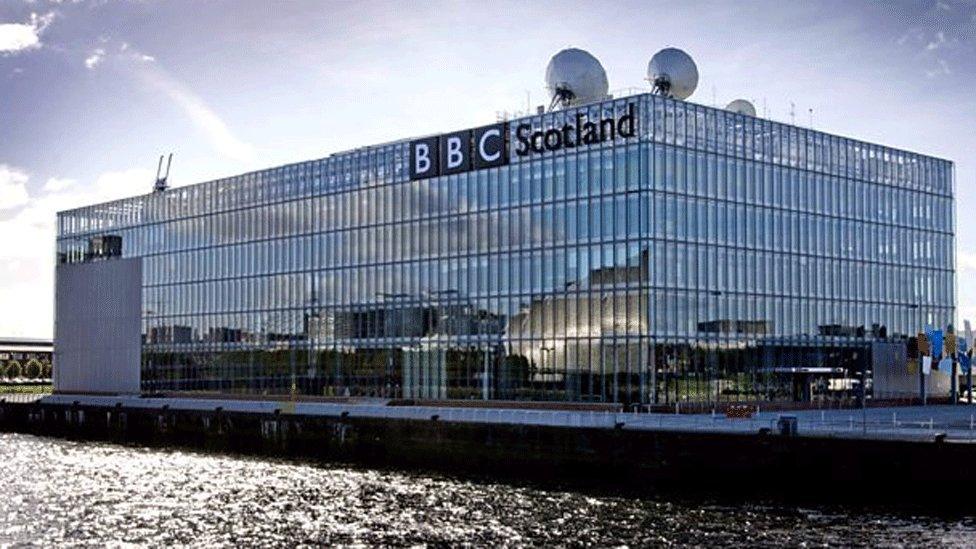The battle for readers and viewers
- Published

Britain's biggest commercial news publisher is after your data, as part of a vigorous shake-up of the battle for readers and viewers.
Newspapers have been slow to tap that source of reader value, while US-based tech giants have gobbled the advertising market.
Newsprint sales continue to fall, for most, while the BBC's future is under pressure from market disruption and politics.
If you haven't yet been "engaged in a key vertical", brace yourself.
The Daily Record stable of newspapers, which is Britain's biggest, currently provide access to online content for free, are about to demand your data.
That includes the Mirror, Express, their weekly partners including the Sunday Mail and many more local titles.
According to Jim Mullen, the Glaswegian who has led publisher Reach plc since last August, this "will enable us to better personalise our offering and introduce customers to new products and services".
It's to get "a better understanding of their behaviour and interests".
Sounds very considerate of him, doesn't it? But as you're probably aware, he's tapping into that data - your data - because, in the right hands, it's gold dust.
Up front, it can lead to personalised ads. Behind the algorithms, and diving deep into the "key verticals", it can be mixed with numerous other data sources to provide a rich and textured picture of customer behaviour, spending power and preferences.
This shouldn't shock you. Those who use the big four - Google, Facebook, Amazon and Microsoft - are handing over vast amounts of information to them. In turn, they have become immensely powerful and valuable controllers of the data and algorithms that shape our online experience.
Hacked off
What might shock you more is how slow news publishers have been to join in.
Reach plc - formerly Trinity Mirror until it merged with the Express and Star group - gets data from only a tiny proportion of its online users - around 2% of 47 million users who ramble across its news sites, at least occasionally.
Mr Mullen wants it to become the fifth big player, at least in the UK.
The chief executive announced this initiative while revealing improved financial results for 2019.
That may have helped draw attention away from the £86.5m bill, so far, that his company has had to pay out or set aside for those whose phones it hacked - substantially up on last year.

Reach plc, which has the Daily Record in its group, is about to demand your data
Meanwhile, the print end of news continues to look weak and, for those of us proud to have worked in it, sad.
Some 61% of revenue from Reach newspapers comes from circulation (the cover price), down by 4.5%. Falling sales have been offset by higher prices.
In advertising, which delivers 39% of print revenue, it's down 19% in only one year.
Regional titles
The results were published in the wake of the industry's annual upsum on what they call "regional" titles. That description used to make Scottish national newspaper editors bristle with indignation. But falling sales of their print editions has made the "regional" description all too true.
The Audit Bureau of Circulation, owned by the industry, has just published figures for July to December, which show the not-so-national Scotsman shifting only 14,400 copies a day. Of those, 2,700 are given away.
Ten years ago, the Scotsman was selling 43,000. Until recently, it gave away online content for free, hoping that digital advertising at scale would make up for lost print sales. Those hopes haven't come to much.
After waves of cuts to editorial budgets, the financiers who bought the assets of Johnston Press, its former Edinburgh-based owner, when that was put into administration, are trying to sell.
Further north, in Dundee and Aberdeen, the city-based papers have declined, but not nearly as sharply. It seems that it helps not to aspire to be national, but instead to serve an established regional market within Scotland.
The Courier was down 3,000 on 2018, to 30,200 daily sales, on average, in the second half of last year.
The Press and Journal was down at a similar pace, to 39,500.
Deep pockets
By last month, among the papers classified as "national", the Scottish Sun was shifting 154,400 copies daily, both the Record and its Sunday Mail stablemate were just above 100,000.
Ten years ago, the Sun sold 340,000 while the Record was shifting 300,000 daily in Scotland, and 35,000 south of the border.
Last month, the Scottish Daily Mail was selling 70,200 in its average daily sale, and the Express 31,700.
The once world-beating Sunday Post sells 68,200 weekly.
For those publishers who see the death of print as inevitable, milking it for profit while they can, The Times shows it doesn't have to be that way.
It has combined reduced price print sales with online subscriptions, and other benefits from club membership. The paper's publisher has also used deep pockets to continue investing in journalism. The result is print sales which have defied the powerful sector gravity, and last month sold 28,400.
And The Herald? Or its stablemate, The National? Ten years ago, the Herald was selling more than 50,000. By 2018, that was below 20,000.
Then, during last year, American-owned publisher Newsquest opted out of the Audit Bureau of Circulation. It opted into a specialist at counting digital traffic.
Circulation numbers have now been released by BPA, the new auditors, that put Herald circulation on 22,400. The National, with a campaigning take on Scottish independence, is on 10,000 and the Sunday National on 11,000. Those numbers are up on the ABC figures, but may not be directly comparable.
Digital is where most news publishers are picking up new readers. That's where they hope to make a future for news publishing. But being so far behind the Google and Facebook curve in advertising, they have a long way to catch up if they're going to provide any challenge for the digital giants.
Licence to bill
The other news publisher that publishers would love to cut down to size is the BBC. It has a funding stream from the TV licence fee, and the corporation's website soaks up a large share of news traffic.
The opportunity to hobble it may have arrived, with a UK government consultation on the proposal that it ends the pursuit of licence fee non-payers through criminal law.
To that, add barely anonymised briefings from Downing Street that there's a project to force the BBC into shedding numerous services which compete with commercial media.

The BBC has come under pressure over the licence fee
The corporation's competitors for viewer eyeballs - and notably younger ones - are now Netflix, Amazon and Sky, investing heavily to recruit and retain subscribers with glossy entertainment. In that environment, justifying the licence fee clearly gets harder.
The older newsprint publishers are unlikely either to come to the BBC's aid, or to shed a tear.
But along with ITV and STV, they fear the prospect of the BBC being forced to sell advertising. That competition could do a lot of damage to their advertising revenue.
John McLellan, spokesman for the newspaper publishers, wrote in The Scotsman last week about the perception of commercial publishers struggling in markets such as Orkney and Shetland, where the BBC offers local radio news services.
BBC Scotland's year-old digital channel is also under assault from critics over the size of its audiences. They are a long way behind the main four terrestrial channels - BBC1, ITV1, BBC2 and Channel Four. That should be no surprise. The BBC response is that the new channel does well against the dozens of others that compete further down the Electronic Programme Guide, and search for content on iPlayer has risen a lot and consistently.
"So much of the debate about the BBC in Scotland surrounds the spending settlement and alleged anti-SNP bias," wrote Mr McLellan, "while the really big questions about the suitability and sustainability of the licence fee, how Scottish public service broadcasting can be sustained, and the BBC's relationship with commercial media large and small go largely unanswered."
There are no simple answers - and any complex answer has to take into account the media market clout of the digital giants.
Taxing them fairly would surely help reduce their capacity for disruptive destruction. But that requires international agreement. And while President Trump is around, and Britain tries to curry favour with him and other trading partners around the globe, such tax fairness seems a distant prospect.
